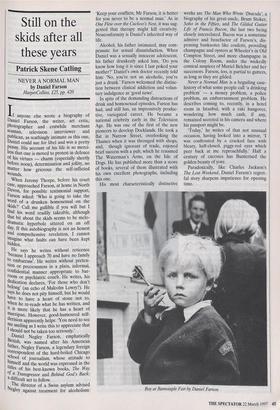Still on the skids after all these years
Patrick Skene Catling
NEVER A NORMAL MAN by Daniel Parson HarperCollins, i25, pp. 420 If anyone else wrote a biography of Daniel Farson, the writer, art critic, Photographer and erstwhile merchant seaman, television interviewer and publican, as scathingly intimate as this one, Daniel could sue for libel and win a pretty Penny. His account of his life is so merci- less that one is moved to protest in defence of his virtues — charm (especially shortly before noon), determination and jollity, no matter how grievous the self-inflicted wounds.
When Jeremy Thorpe, before his court case, approached Farson, at home in North Devon, for possible testimonial support, Parson asked: 'Who is going to take the word of a drunken homosexual on the skids?' Call me gullible if you will but I find his word readily takeable, although that bit about the skids seems to be melo- dramatic hyperbole uttered on an off day. If this autobiography is not an honest and comprehensive revelation, I cannot imagine what faults can have been kept hidden.
He says he writes without reticence `because I approach 70 and have no family to embarrass'. He writes without preten- sion or preciousness in a plain, informal, confidential manner appropriate to bar- room or psychiatric couch. He writes, his dedication declares, Tor those who don't belong' (an echo of Malcolm Lowry?). He says he does not pity himself, but he would have to have a heart of stone not to, when he re-reads what he has written, and it is more likely that he has a heart of marzipan. However, good-humoured self- derision apparently helps: 'You need to see nit smiling as I write this to appreciate that I should not be taken too seriously.' Daniel Negley Parson, emphatically British, was named after his American father, Negley Farson, a legendary foreign correspondent of the hard-boiled Chicago ,school of journalism, whose attitude to himself and the world was expressed in the titles of his best-known books, The Way of a Transgressor and Behind God's Back: a difficult act to follow.
Negley director of a Swiss asylum advised Negley against treatment for alcoholism: `Keep your conflicts, Mr Farson, it is better for you never to be a normal man.' As in One Flew over the Cuckoo's Nest, it was sug- gested that therapy might kill creativity. Nonconformity is Daniel's inherited way of life.
Alcohol, his father intimated, may com- pensate for sexual dissatisfaction. When Daniel was a sexually innocent adolescent, his father drunkenly asked him, 'Do you know how long it is since I last poked your mother?' Daniel's own doctor recently told him: 'No, you're not an alcoholic, you're just a drunk.' Farson welcomed the distinc- tion between clinical addiction and volun- tary indulgence as 'good news'.
In spite of the demanding distractions of drink and homosexual episodes, Farson has had, and still has, an impressively produc- tive, variegated career. He became a national celebrity early in the Television Age. He was one of the first of the new pioneers to develop Docklands. He took a flat in Narrow Street, overlooking the Thames when it was thronged with shops, and, though ignorant of trade, enjoyed brief success with a pub, which he renamed The Waterman's Arms, on the Isle of Dogs. He has published more than a score of books, several of them illustrated with his own excellent photographs, including this one.
His most characteristically distinctive works are The Man Who Wrote Dracula', a biography of his great-uncle, Bram Stoker, Soho in the Fifties, and The Gilded Gutter Life of Francis Bacon, the last two being closely interrelated. Bacon was a sometime admirer and benefactor of Farson's, dis- pensing banknotes like confetti, providing champagne and oysters at Wheeler's in Old Compton Street, and more champagne in the Colony Room, under the wickedly comical auspices of Muriel Belcher and her successors. Farson, too, is partial to gutters, as long as they are gilded.
Never a Normal Man is a beguiling case- history of what some people call 'a drinking problem' — a money problem, a police problem, an embarrassment problem. He describes coming to, recently, in a hotel room in Istanbul, with a raki hangover, wondering how much cash, if any, remained secreted in his camera and where his passport might be.
`Today,' he writes of that not unusual occasion, having looked into a mirror, 'I was confronted by a cracked face with bleary, half-closed, piggy-red eyes which peer back at me reproachfully.' Half a century of excesses has Bunterised the golden beauty of yore.
Paradoxically, like Charles Jackson's The Lost Weekend, Daniel Farson's regret- ful story sharpens impatience for opening time.
Boy at Barnstaple Fair by Daniel Farson


































































 Previous page
Previous page